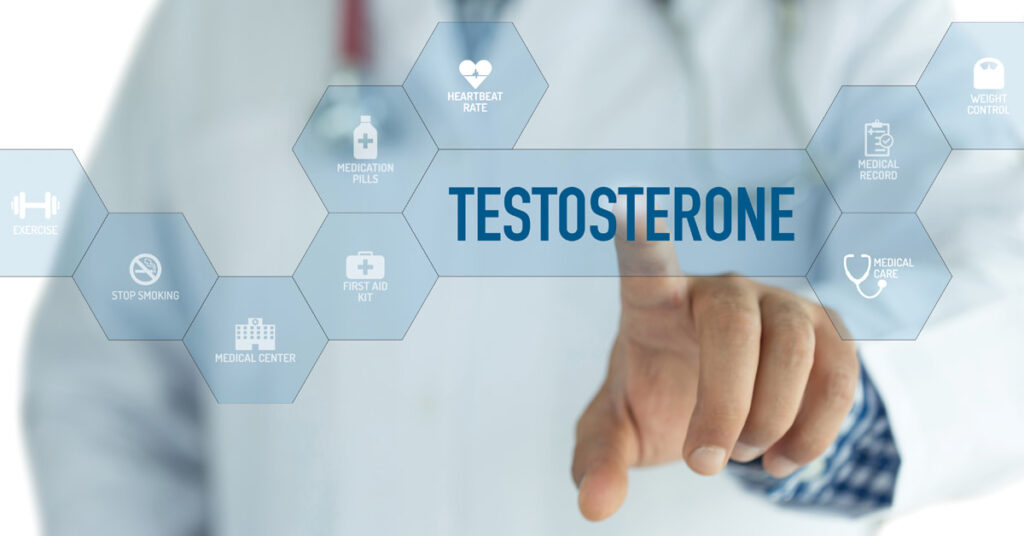Testosterone Replacement Therapy has become quite popular and sought after with Hollywood stars like Kate Winslet resorting to it for her optimal health. Testosterone is one of the most well-known hormones in the human body, often linked to masculinity, energy, and libido. But its role goes far beyond just fueling the male sex drive. In both men and women, testosterone is responsible for a wide range of physiological functions. As individuals age, the levels of this crucial hormone decline, leading to changes in health and well-being. Testosterone Replacement Therapy has gained significant attention as a way to mitigate these changes. However, this treatment has its advantages, risks, and limitations.

What Is Testosterone?
Testosterone is a hormone from the androgen group and is a steroid hormone. It is predominantly produced in the testes in males and, to a lesser extent, in the ovaries in females. Adrenal glands also produce a small quantity of this hormone. Testosterone plays a crucial role in the development of male reproductive tissues such as the testes and prostate, as well as secondary sexual characteristics, including muscle mass, bone density, and body hair. It also contributes to health and well-being, particularly by enhancing mood, energy levels, and cognitive functions.
The Importance of Testosterone in the Body
Testosterone is often referred to as the “male hormone” due to its critical role in male sexual development. However, women also produce and require testosterone for many essential bodily functions. The hormone impacts various systems in the body:
Sexual Function and Libido: Testosterone is a key driver of libido in both men and women. In men, it is essential for erectile function and the production of sperm. Low levels of testosterone can lead to decreased sexual desire and impotence.
Muscle Mass and Strength: Testosterone plays a critical role in the development and maintenance of muscle mass and strength. This is one of the reasons why women don’t have as much muscle mass as men.
Bone Density: Testosterone lowers the risk of osteoporosis and fractures by maintaining bone density. Low testosterone levels in men can lead to bone weakness and increased susceptibility to fractures.
Mood and Energy Levels: Testosterone influences mood regulation, energy levels, and feelings of well-being. Low levels of testosterone can cause multiple health issues like fatigue, irritability, and depression.
Cognitive Function: Adequate testosterone levels are linked with cognitive sharpness, memory retention, and the ability to concentrate. Research suggests that declining testosterone levels may be associated with an increased risk of neurodegenerative diseases, such as Alzheimer’s.
What Happens to Testosterone Levels with Age?
Testosterone levels peak in early adulthood, usually around the age of 18-20, and gradually decline with age. In men, testosterone production decreases by approximately 1-2% per year after the age of 30. By the time men reach their 60s and 70s, testosterone levels may be significantly lower than during their youth.
In women, testosterone levels also decline with age, particularly after menopause, when ovarian production of hormones, including testosterone, decreases dramatically.
Symptoms of Low Testosterone
Low testosterone levels, often referred to as “low T,” can manifest in a variety of symptoms. These may include:
Reduced libido and sexual function
Fatigue and low energy
Decreased muscle mass and strength
increased body fat, especially around the abdomen
decreased bone mass and elevated osteoporosis risk
Irritability, depression, and mood swings
Cognitive decline, memory issues, and poor concentration
The Importance of Testosterone in Male and Female Bodies
In Men
Testosterone is the hormone solely responsible for the development traits and characteristics unique to men such as :
Deepening of the voice during puberty
Growth of facial, pubic, and body hair
Development of muscle mass and strength
Growth of the penis and testes
Production of sperm and the regulation of libido
Testosterone is also essential for maintaining overall health, influencing everything from bone density to fat distribution and red blood cell production.
In Women
Although women produce much lower levels of testosterone compared to men, it is still crucial for their health and well-being. In women, testosterone contributes to:
Libido and sexual arousal
Bone strength and density
Muscle mass and fat distribution
Mood regulation and mental health
In women, low testosterone levels may contribute to reduced sexual desire, fatigue, depression, and a decline in muscle tone.
What Is Testosterone Therapy?
Testosterone Replacement therapy (TRT) involves supplementing the body with synthetic testosterone to restore levels to a normal, healthy range. It is often prescribed for individuals who have been diagnosed with low testosterone (hypogonadism), a condition in which the body fails to produce sufficient amounts of testosterone.
Testosterone Replacement Therapy is available in various forms:
Injections: Administered directly into the muscle, typically every 1-4 weeks.
Gels and Creams: Applied topically to the skin, where the testosterone is absorbed into the bloodstream.
Patches: Similar to gels, these patches are placed on the skin and release a steady dose of testosterone.
Oral Tablets: Less common, as oral testosterone can negatively affect the liver.
Pellets: Implanted under the skin, where they release testosterone over a period of months.
Can Testosterone Replacement Therapy Promote Libido, Youthfulness, and Vitality?
Libido and Sexual Function
One of the most well-documented benefits of Testosterone Replacement therapy is the improvement in sexual function. Many men report enhanced libido, stronger erections, and better sexual performance after starting testosterone therapy. In women, testosterone therapy can improve sexual desire, particularly in postmenopausal women experiencing low libido.
Youthfulness and Vitality
Testosterone Replacement Therapy has been associated with increased energy levels, improved mood, and an overall sense of well-being. Some men and women report feeling more “youthful” and vibrant after beginning therapy, with reduced feelings of fatigue and a noticeable boost in daily vitality.
Muscle Mass and Strength
Testosterone Replacement Therapy can lead to an increase in muscle mass and strength, particularly in men. This is especially beneficial for older individuals looking to regain lost muscle tone and improve physical function.
Risks Associated with Testosterone Therapy
While testosterone Replacement Therapy has clear benefits for individuals suffering from low testosterone levels, it is not without its risks. Potential side effects include:
Cardiovascular Issues: Some studies suggest that Testosterone Replacement Therapy may increase the risk of heart attacks, strokes, and other cardiovascular events, particularly in older men with pre-existing heart conditions.
Prostate Health: There is concern that Testosterone Replacement Therapy could fuel the growth of prostate cancer cells. However, the evidence is not final and decisive, and needs more research is needed in this field.
Sleep Apnea: Testosterone therapy may worsen sleep apnea, a serious sleep disorder in which breathing repeatedly stops and starts.
Acne and Skin Reactions: Some individuals experience increased acne or oily skin as a result of Testosterone Replacement Therapy. This is more common with topical applications such as gels and creams.
Testicular Shrinkage and Fertility Issues: Testosterone Replacement Therapy can suppress natural testosterone production, leading to testicular shrinkage and reduced sperm count, potentially affecting fertility.
Mood Swings and Aggression: High levels of testosterone supplementation can sometimes result in mood swings, irritability, and increased aggression.
Advantages of Testosterone Replacement Therapy
Despite the risks, testosterone therapy offers significant benefits for those with low T levels:
Improved Sexual Function: As mentioned earlier, Testosterone Replacement Therapy can significantly enhance libido, erectile function, and sexual satisfaction in men and women.
Increased Muscle Mass and Strength: Many individuals experience improved physical strength and muscle mass, which can be especially beneficial for aging adults.
Enhanced Mood and Mental Clarity: Testosterone Replacement Therapy has been linked to improved mood, reduced feelings of depression, and enhanced cognitive function.
Better Bone Health: By maintaining or increasing bone density, Testosterone Replacement Therapy helps reduce the risk of osteoporosis and fractures.
Boosted Energy Levels: Many people on eTstosterone Replacement Therapy report higher energy levels and reduced feelings of fatigue, allowing them to lead more active lives.
Frequently Asked Questions
1. Who Is a Candidate for Testosterone Replacement Therapy?
Individuals with clinically diagnosed low testosterone levels, often confirmed by blood tests and symptomatic presentation, are potential candidates. Men and women with hypogonadism or age-related testosterone decline are commonly considered for treatment.
2. How Is Low Testosterone Diagnosed?
Low testosterone is diagnosed through a combination of blood tests and clinical evaluation of symptoms. The most accurate test is a blood test taken in the morning when testosterone levels are typically at their peak.
3. Can Women Benefit from Testosterone Replacement Therapy?
Yes, women can benefit from Testosterone Replacement Therapy, especially postmenopausal women who experience a decline in libido, energy, and muscle tone. However, treatment should be carefully monitored to avoid side effects associated with excess testosterone.
4. Is Testosterone Replacement Therapy Safe?
Testosterone Replacement therapy is generally considered safe when used under medical supervision. However, individuals with certain conditions, such as prostate cancer or cardiovascular disease, should approach therapy with caution. It’s essential to consult a healthcare provider to determine if the therapy is appropriate for you.
5. How Long Does It Take to See Results?
Most individuals start to notice improvements in energy, libido, and mood within a few weeks of starting therapy. However, changes in muscle mass, bone density, and overall body composition may take several months to become noticeable.
6. Can Testosterone Replacement Therapy Affect Fertility?
Yes, testosterone therapy can reduce sperm production, potentially leading to infertility in men. Men who are planning to have children should discuss this risk with their healthcare provider before starting treatment.
7. Are There Natural Ways to Boost Testosterone?
Yes, certain lifestyle changes, such as regular exercise, weight management, adequate sleep, and a balanced diet, can naturally boost testosterone levels. Reducing stress and avoiding excessive alcohol consumption can also help maintain healthy testosterone levels.
8. How Long Does Testosterone Replacement Therapy Last?
Testosterone Replacement Therapy is often a long-term treatment, especially for those with chronic conditions like hypogonadism. Regular monitoring and adjustment of dosages are crucial to maintaining optimal results and minimizing side effects.
Conclusion
Testosterone Replacement Therapy can offer significant benefits for individuals with low testosterone, from improving libido and mood to enhancing muscle mass and bone density. However, it’s essential to weigh the potential risks, such as cardiovascular issues, sleep apnea, and fertility problems. As with any medical treatment, testosterone therapy should be approached cautiously and tailored to each individual’s unique needs and health profile. If you’re considering testosterone therapy, consult a healthcare provider to determine if it’s the right course of action for you.
Understanding both the advantages and potential pitfalls of testosterone therapy will allow individuals to make informed decisions about their health and well-being.
Reference : http://www.mayoclinic.org
Disclaimer : The above article is only for educational purposes. Consult your medical practitioner before acting on any information rendered in the article.







